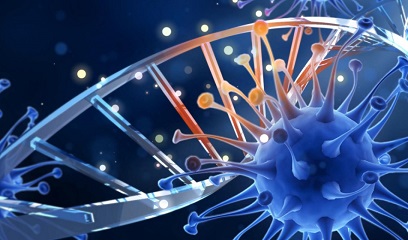TYK2, A Gene Associated With Lupus Provides Protection Against SARS-CoV-2 Infection And COVID-19 Severity But Increases Risk For Autoimmune Disease
Source: Medical News - TYK2 Gene Prevents COVID-19 Severity Nov 04, 2022 3 years, 3 months, 1 week, 3 days, 6 hours, 34 minutes ago
Researchers from King’s College London - United Kingdom have discovered that the gene TYK2 that is associate with systemic lupus erythematosus (SLE) provides protection against SARS-CoV-2 infections and also prevents COVID-19 severity but increases the risk for autoimmune diseases.

The study team observed a correlation between the genetic associations with severe COVID-19 and those with systemic lupus erythematosus (SLE, Lupus), and aimed to discover which genetic loci were shared by these diseases and what biological processes were involved.
Their study resulted in the discovery of several genetic loci, some of which had alleles that were risk for both diseases and some of which were risk for severe COVID-19 yet protective for SLE.
Importantly, the locus with most evidence of shared association (TYK2) is involved in interferon production, a process that is important in response to viral infection and known to be dysregulated in SLE patients. Other shared associated loci contained genes also involved in the defense response and the immune system signaling.
The study findings add to the growing evidence that there are alleles in the human genome that provide protection against viral infection yet are risk for autoimmune disease.
To date, genome wide association (GWA) studies show there is a genetic component to severe COVID-19.
The study team found evidence that the genome-wide genetic association signal with severe COVID-19 is correlated with that of systemic lupus erythematosus (SLE), having formally tested this using genetic correlation analysis by LD score regression.
In order to identify the shared associated loci and gain insight into the shared genetic effects, using summary level data the study team performed meta-analyses, a local genetic correlation analysis and fine-mapping using stepwise regression and functional annotation.
The approach led to the identification of multiple loci shared between the two traits, some of which exert opposing effects. The locus with most evidence of shared association is TYK2, a gene critical to the type I interferon pathway, where the local genetic correlation is negative.
The study team also identified another shared locus that is CLEC1A, where the direction of effects is aligned, that encodes a lectin involved in cell signaling, and the anti-fungal immune response.
The study findings suggest that several loci with reciprocal effects between the two traits have a role in the defense response pathway, adding to the evidence that SLE risk alleles are protective against infection.
The study findings were published in the peer reviewed journal: PLOS Genetics
https://journals.plos.org/plosgenetics/article?id=10.1371/journal.pgen.1010253
Scientists from Wake Forest University School of Medicine, Winston-Salem, North Carolina – USA and NIHR GSTFT/KCL Biomedical Research Centre, London – UK also contributed to the study.
The discovery of TYK2 and CLEC1A adds to the growing list of genetic variants that may put people at risk of autoimmune diseases while conferring protection against the outcome of viral infection.
Thailand
/www.thailandmedical.news/">Medical News had previously covered other studies that have identified human host gene variants that contribute to COVID-19 severity.
https://www.thailandmedical.news/news/researchers-identify-hub-genes-stat1,-irf7,-isg15,-mx1,-and-oas1-that-increases-covid-19-severity-in-diabetic-kidney-disease-patients
https://www.thailandmedical.news/news/university-of-college-london-study-shows-that-both-the-oas1-gene-is-a-risk-factor-for-both-alzheimer-s-disease-and-covid-19-severity
https://www.thailandmedical.news/news/breaking-german-study-discovers-eight-human-proteins-and-genes-that-determine-covid-19-outcomes-with-the-elf5-gene-being-most-important
https://www.thailandmedical.news/news/covid-19-genetics-university-of-edinburgh-study-confirms-that-genes-are-critical-to-new-covid-19-treatments
This new study suggests that genetic predisposition for systemic lupus erythematosus (SLE) may be protective against severe COVID-19 infection.
The study team had previously observed a correlation between the genes associated with severe COVID-19 and those with SLE.
However, in order to locate associated genes and gain insight into the shared genetic effects, the study team compared the genetics of severe COVID-19 with those of SLE using multiple analyses, including an approach that can focus on specific areas of the genome.
The study team then accessed data on genes and the structure of the genome obtained from several biomedical databases to understand the biology of the shared genetics.
The study team found that TYK2, a gene associated with both SLE and severe COVID-19 provides protection against viral infection, but increases risk for autoimmune disease. Future studies will be needed to fully understand the genetic relationships between COVID-19 and other diseases.
However, the study has its limitations, such as the overrepresentation of European ancestry in the datasets used to perform the analyses.
Corresponding author, Dr Timothy J. Vyse a Professor at the Department of Medical & Molecular Genetics, King’s College London told Thailand
Medical News, "Our study findings indicate that there are shared genetic effects between the autoimmune disease SLE and the clinical consequences of COVID-19. The locus with the most evidence of shared association (TYK2) is involved in interferon production, a process that is important in response to viral infection and known to be dysregulated in SLE patients. In seeking to uncover the mechanisms underlying these relationships it was apparent that the functional effects of the risk and protective genotypes are complex."
Co-lead researcher, Dr David Morris who is also from the Department of Medical & Molecular Genetics, King’s College London added, "This is an exciting result made possible by the large genetic studies in COVID-19 and lupus, and opens the door to our understanding of how the biology of the immune system is calibrated to protect us against infection from viruses and other infectious agents, but at the risk of developing autoimmune disease."
For the latest
COVID-19 Research, keep on logging to Thailand
Medical News.
